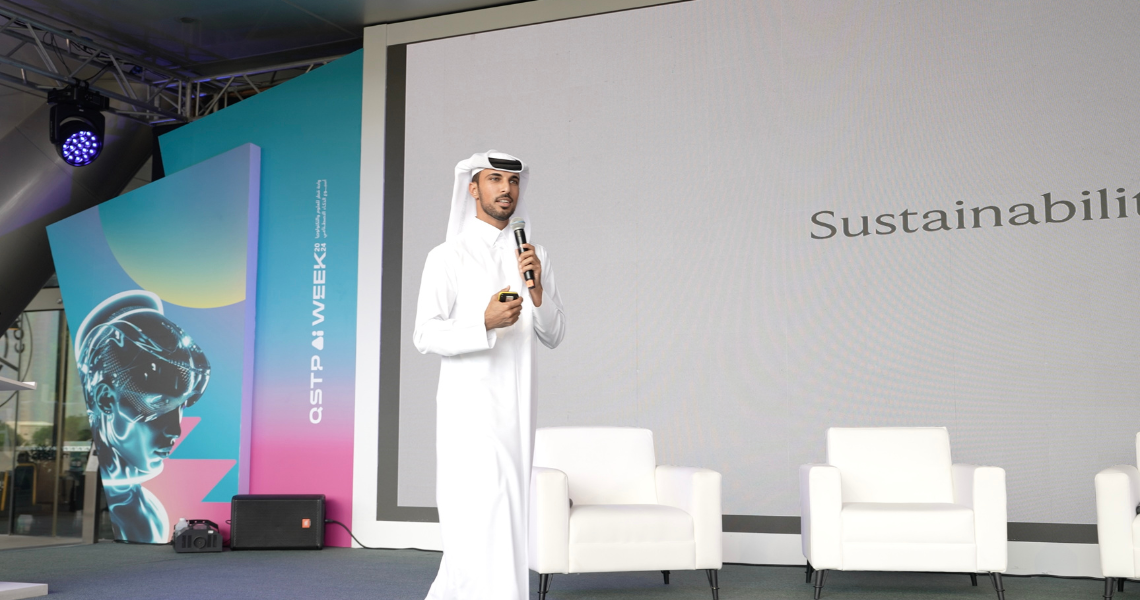Over 3,000 local and global tech experts, academics and entrepreneurs joined inaugural AI Week hosted by QF’s QSTP
Artificial intelligence (AI) is not just a tool, but an invitation to rethink how we solve problems, grow economies, and improve lives, said Her Excellency Reem Mohammed Al Mansouri, Assistant Undersecretary for Digital Industry Affairs, Ministry of Communications and Information Technology (MCIT), speaking at Qatar Science & Technology Park’s (QSTP) - part of Qatar Foundation (QF) - AI Week 2024.
"Under the visionary leadership of HH Sheikh Tamim bin Hamad Al Thani, Artificial Intelligence has become a cornerstone of Qatar’s national development strategy and digital agenda. With bold initiatives and a clear vision, the government is prioritizing technology and innovation, positioning AI at the heart of urban and economic growth. Through the National AI Strategy, Qatar is integrating AI into critical services such as traffic management, energy optimization, and public safety, creating smarter, more livable, and sustainable cities for all. AI is not just a technological advancement; it is a transformative force poised to contribute $15.7 trillion to the global economy by 2030—surpassing the combined GDPs of China and India today."
Looking into opportunities and trends for AI development in the Middle East, Dr Sanjay Chawla, Chief Scientist at Qatar Computing Research Institute (QCRI) of Hamad Bin Khalifa University (HBKU), who is part of the Fanar project, said, “There is a lot of talk about big data but surprisingly there is a dire shortage of big Arabic data to build a bigger AI model.”
Arabic is spoken by over 500 million people and is the national language of 27 countries, “but the Arabic content on the web is only 0.5 percent,” Dr Chawla pointed out. “What we really need, at a national and regional level, is collaboration to collect more Arabic data, he emphasized, adding that efforts in promoting Arabic through the fields of science and engineering will propel more innovation in AI in the region.”
The subject of ethics in AI was also central to discussions during the week with experts calling for transparency and education as fundamental principles to embrace in an increasingly AI-centric world. "Foundational models have trained vast amounts of data from around the world. As we have bias in society, we have bias in these models, and it affects our future,” underlined Bekir Ciftler, Head of Data Sharing & Artificial Intelligence Department at University of Doha for Science and Technology (UDST). “We need more democratized, open-source technologies,” he said, urging decisionmakers to establish academic and regulatory initiatives that drive responsible AI usage.
AI’s pivotal role in powering Autonomous Vehicles (AVs) and ushering in a new era of transportation in the region was another key discussion point at the event. Experts agreed that the region is an ideal testbed for autonomous technologies, particularly due to its advanced infrastructure and emphasis on sustainability, but much work is required to address issues around trust, privacy and safety before widespread adoption.
QSTP AI Week 2024 gathered more than 3,000 local and global experts, innovators, academics and researchers, students and tech enthusiasts. It was organized in partnership with Qatar's Ministry of Communications and Information Technology, Shell, and Qatar Scientific Club. Al Jazeera Media Institute served as the event media partner. The week featured 54 speakers, 92 local and international exhibitors featuring cutting-edge technologies, 40 AI immersive workshops, a series of expert panel discussions and inspirational talks.
Commenting on the occasion, Dr Jack Lau, President of QSTP, said, “QSTP is exceptionally proud of what we have achieved as a team. The amazing turnout at the event and the conversations we have had as a community are only the starting point. We are confident that these discussions will fuel future partnerships unlocking new possibilities for AI development in Qatar and beyond - especially with the participation of 13 international tech startups, part of QSTP’s Global Innovation Link program, who were introduced to Qatar’s thriving tech ecosystem, opening opportunities for cross-border collaborations. We call on the community to take advantage of such gatherings to understand the impact of technology and how we can contribute and collectively shape a future of boundless possibilities.”
Leading organizations including Google and Shell utilized the platform to engage the community and advance knowledge exchange. Google’s DevFest 2024 was held during the event featuring hands-on demos, workshops, and code labs on the latest Google tech.
Ramesh Chander, Head of Developer Relations for Middle East North Africa, Turkey & Central Asia at Google said: “Google has always been committed to empowering developers around the world. In the Middle and North Africa, we have witnessed remarkable growth in our developer community and I’m thrilled to be part of this journey. GDDs (Google Developer Days) are more than just meetups. They are vibrant communities that bring developers of all levels and connect them with experts, to enable them to stay up to date with the latest technologies.”
Shell showcased a range of different technologies, offering visitors a chance to understand the role of robotics, 3-D printing, and virtual reality in enhancing safety and efficiency of operations at oil and gas facilities. They also engaged visitors through digital twin technology that presented a digital representation of an oil and gas facility.
QSTP AI Week 2024 also saw two youth-focused competitions; an AI Hackathon that engaged school students in exploring the role of robotics to tackle environmental challenges, and Ride & Pitch that involved university students and startups in coming up with innovative solutions harnessing AI.
To learn more about QSTP, please visit: https://qstp.org.qa/.



